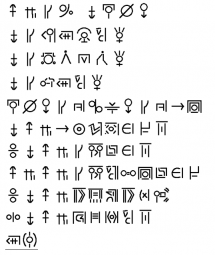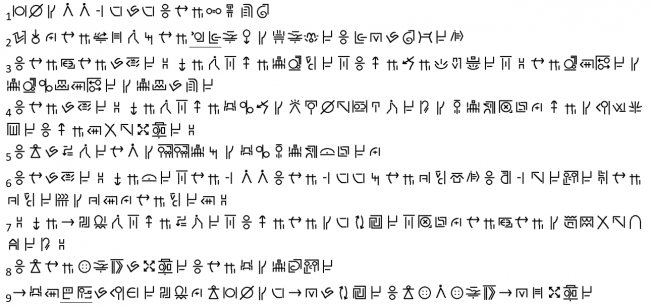Qihep
| Ul la Qīxēp ā xūc vol dī tȳn la dōb topīk |
| Welcome, students of Qihep! |
Qihep (in Qihep: Qīxēp [ˌkʷiːˈxeːp]) is a constructed fantasy language. It is an isolating language and uses a logographic script.
Phonology
- Main article: Qihep phonology
Script
- Main article: Qihep script
Morphology
- Main article: Qihep morphology
Syntax
- Main article: Qihep syntax
Lexycon
Dictionary
- Main article: Qihep-English dictionary
Everyday lexycon
- Eh: Hi, Hello
- Tū dōb des: Good morning (lit. May the morning be good)
- Lū dōb des: Good afternoon (lit. May the afternoon be good)
- Ān dōb des: Good evening (lit. May the evening be good)
- Pū dōb des: Good night (lit. May the night be good)
- Ma uś fut ro: Bye (lit. May you be fine)
- Ul (la) ma (la) dōb topīk: Welcome (lit. I/we receive well you)
- Ma dī ǵīv wūcin lo: How are you? (lit. How is your life?)
- Dōb dā, Well (lit. Good yes)
- Dōbdōb dā, Very well (lit. Very good yes)
- Ēp, Thank you
- Ēpēp, Thank you very much
- Tyk nanqem: You're welcome (lit. This is nothing)
- Ma wūcin ńīm lo or Wū ma dī ńīm lo: What is your name?
- Ul ... ńīm or Ul dī ńīm ...: My name is ...
- Ma wō rok smel ǵa lo: How old are you? (lit. How many years have you grown?)
- Ul ... rok smel ǵa: I am ... years old (lit. I have grown ... years)
The days of the week - Śotsēd dī bultsēd la
| English | Qihep |
|---|---|
| Monday | Komśotsēd |
| Tuesday | Upśotsēd |
| Wednesday | Pyśotsēd |
| Thursday | Dūśotsēd |
| Friday | Krajśotsēd |
| Saturday | Natbultsēd |
| Sunday | Pōbultsēd |
The months of the year - Qārtsēd
| English | Qihep | English | Qihep |
|---|---|---|---|
| January | komqārtsēd | July | gōqārtsēd |
| February | kōqārtsēd | August | gōgōqārtsēd |
| March | klojqārtsēd | September | epīkqārtsēd |
| April | āvqārtsēd | October | lisqārtsēd |
| May | rasesqārtsēd | November | lēdqārtsēd |
| Juny | srīqārtsēd | December | krajqārtsēd |
The seasons of the year - Roktsēd
| English | Qihep |
|---|---|
| Spring | Argōtsēd |
| Summer | Gōtsēd |
| Autumn Fall |
Arbȳtsēd |
| Winter | Bȳtsēd |
States of the world - Dīn elān la
- Main article: States of the World (Qihep)
The names of the states of the world are usually loanwords, so they are expressed by phonetic compounds, with normal syllables used for their phonetic value instead of their meaning. They are thus usually written with an underline. Names like state, kingdom, federation or democratic are not used directly but they are translated and not underlined.
The names of the states can be used as the relative adjective, and can be compounded to express the name of the inhabitants and of the related language.
- Itālia: Itālia vranvran, Italian population, Itāliavran, an Italian, Itāliaxēp, the Italian language
Some states have however developed an alternative adjectival form. This form will be used for the compound words, if they refer to the culture, while the name of the country will still be used when referring to the state.
- Doiclān: Doiclān vranvran, Doiclānvran, an inhabitant of Germany, but doicvran, a person speaking German, doicxēp, the German language
Dialogues
- Main article: Qihep dialogues
Texts
Lord's prayer
| Logographic script | Latin transcription |
|---|---|
| ul la dī pāp, ma kōpdīn stā ma dī ńim ā śkedskyt des ma dī horvranmeś qin des ma dī wiś ā skyt des kōpdīn stā dī do i grūn stā dī do tykcin ma ul la tykbultsēd pām kreś fa si ī ma ul la dī smūś vorkreś si ul la ul la dī smūśmor mēmcin vorkreś fa ī ma ul la togrēxkȳt to pē mūh yt ma ul la śluk ud vrīskyt si āmen |
Babel text
1. tsāl dīn dī vranvran mē xēp rā xēp ī tȳn la mēm dum nūt sōl
2. tsēd o le tȳn la xīs ud qin sty tȳn la Śinār lān stā dī sbēnlān qum fa ī nārmeś rā sōlǵīv fa kōm
3. ī tȳn la drug tȳn la rā kāǵ fa "ma la qin si ul la trojsās skyt fa si ī ul la qem la pīr ō qōc fa si" tȳn la sās ā skām fa dī trojsās i kāx ā skām fa dī trojkāx rā nūt fa
4. ī tȳn la rā kāǵ fa "ma la qin si ul la byl i qem dī fīp kōpdīn fut dūbim fa pos dī fītrojkȳt tsel vor le ul la dī ńīm snāsy bly fa ī ul la ā nat fut rasjēq fa"
5. ī Pō rā dōlqin fa tȳn vran dī denden troj sty dī byl i fītrojkȳt piǵvor fa le
6. ī tȳn rā kāǵ fa "ma la piǵ fa si tȳn la mē vranvran ī tȳn la mē xēp xēp sty tȳn la do skyt ǵa kōm ī ńakmē tȳn la fut fajan fa kra tȳn la do skyt fa vol dī do ā le tȳn la skyt fa ā"
7. "ma la tyk prīc par qin si ul la dōlbim fa si ī ul la tȳn la dī xēp obmiś fa si tsel vor le tȳn la drug tȳn la dī xepsvūk nat fut enēm fa pos"
8. ī Pō tȳn la ńik lān to rā rasjēq fa ī tȳn la byl dī trojtān jan fa
9. tyk byl ā Bābēl rā ńīmkreś fa prīc par le Pō tsāl dīn dī xēp tykmeś rā obmiś fa ī Pō ńik vran ńik lān to tykmeś ud rasjēq fa
The Ant and the Grasshopper - Ań i pejūǵ
Ań gōtsēd o jy rā mar sty tȳn cāx bȳtsēd vor epīkvor fa le. Pejūǵ tsāl bultsēd on pej rē. Pejūg ań ū ka fa "ma wūprīc jyjy mar sty lo mā cāx ā mo qum fa ro". Ań rikāǵ fa "ma up bȳtsēd o enēm fa kra". Pejūǵ nat enēm fa ī tȳn nu pej fa kōm ī ań nu mar fa kōm. Bȳtsēd rā dūqin fa ī nev bim fa. Prīc par le tȳn caxnēccum sty pejūǵ ań dī dōm bim fa ī tȳn ka fa "ma ul ńakqem kreś fa ul caxvor fa le lo". Ań ka fa "ma wū ar gōtsēd o skyt sōl lo". Pejūǵ rikāǵ fa "ul ta pej sōl". Ań tyk prīc par kāǵ fa "dōb dā ma mo tsā si"
The Fox and the Grapes - Ew i el
Caxnēcim ew ǵe el rā piǵ fa tȳn yp rē yt tȳn qem nat fanēm kra. Dān o le tȳn vēbim sty tȳn mī fa "ul qem nat wiś qem nat smēl fa". Fatsel ā nat dūbim fa kra dī tȳn la obstātān vīnkreś fa sōl.
The King and the God - An Indoeuropean fable - Horvran i pō
| Qihep | English |
|---|---|
| Rā ē tanhorvran wa le, tȳn den nat ug yt tȳn tanden ug des. Tȳn pōńāvran ka fa: "Ul tanden ug fa des" Pōńāvran tanhorvran kāǵ fa: "Ma We-lu-nos pō vorka nec" Tanhorvran pō vorka fa: "Ma ul tośē fa si, We-lu-nos pāp ho!" We-lu-nos pō kōpdīn ud dōlqin fa ī tȳn kāǵ fa: "Ma wū ka sty lo?" "Ul tanden ug fa des" "Do faē fa si!" Do ā le posim We-lu-nos pō kāǵ fa. Tanhorvran dī āńresvran tanden tyk prīc par ug fa. |
Once upon a time there was a king, he has no child but he wanted a son. He asked a priest: "May I have a son" The priest told the king: "You need to pray to the god Welunos" The king prayed to the god: "Hear me, father Welunos!" The god Welunos came down from heaven and said: "What are you asking for?" "I want a son" "Let it be so!" said the powerful god Welunos. The wife of the king thus bore him a son. |
A walk in the night - Pūnōbim
Ūj nār pū o ta lēdbȳ sty yt tȳn cīn xō nōbim rē. Tȳn dī meśtsel te ba vid yt tȳn lu nat ta tobrin ǵa, tȳn tȳn dī tsel dūbimvor le. Kōpdīn vȳlsē ī tȳn śter la tȳn xub piǵ sty kra. Byl tā te ī qem piǵ nat fro sty. Qār nat ta eś ǵa ī śter ply tsaltācin fatā sty, Śōnpōśter kōpdīngrāf xub dōl stā sty a qem tāimtāim fatā sty. Tȳn Alcīn ygvidygvid nat piǵ sol ī tȳn nis fa, tȳn nār śōnśōn tā grāf fapiǵpiǵvor le.
It was freezing cold that night, but he kept on walking along the street. His destination seemed so far away but he didn't lose his hope in reaching his target. The sky was very clear, and he could see a lot of stars over himself. The lights of the city were far away from there, so they were not a disturbance to the sight. The moon hadn't risen yet, and the stars shone very brightly. Venus was low on the horizon but gave a beautiful strong light. He wasn't habited to see the Milky Way so clearly and stopped a moment to admire that wonderful strip of light.
The scorpion and the frog - Sxȳr i grah
Rā ē sxȳr wa le, qēm pibrēg stā sty ī qēm pi lībim fa vol. Qēm grah piǵ fa ī qēm grah ka fa: "ul ma vorka, ma ul śpom fa si, ul pi lībim fa nec". Grah rikāǵ: "Nā, ul ma fut śpom fa fōr, ma ul fut xȳr fa fōr". Sxȳr tyk prīc par kāǵ fa: "Ul ma fut xȳr fōr, ul la xup fut cum fa fōr. Ul ma nat fut xȳr fa vol". Grah i sxȳr ygmēskyt fa ī sxȳr qēm dī ogcō an yp fa. Dān o le qēm la pi dī py stā stȳ sxȳr grah xȳr fa. Xocim grah sxȳr ka fa dān o le qēm la baccum sty: "Ul ma wūprīc ta xȳr fa lo". Sxȳr rikāǵ fa: " Ul ta snā ǵa ul la fu ta cum fa ā yt ul drugcin ba nat kin fa pos. Ul sxȳr ī tyk ul dī sōcincuv".
Once upon a time there was a scorpion, he was on the bank of a river and wanted to cross it. He saw a frog and asked her: "Please, help me, I must cross the river". The frog replied: "No, If I help you, you will sting me. The scorpion thus said: "If I sting you, we both will die. I will not sting you". The frog agreed with the scorpion and he jumped on her back. While they were in the middle of the river, the scorpion stung the frog. The suffering frog asked the scorpion, while they were drowning: "Why did you sting me?". The scorpion replied: "I knew we would die, but I couldn't do otherwise. I'm a scorpion, that's my nature".



